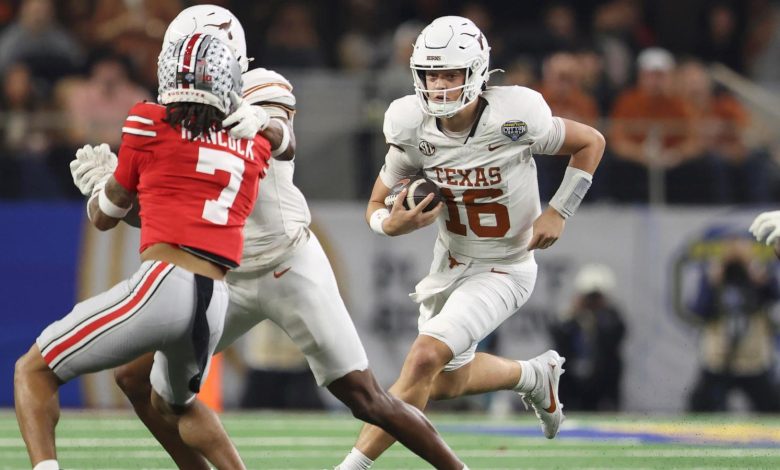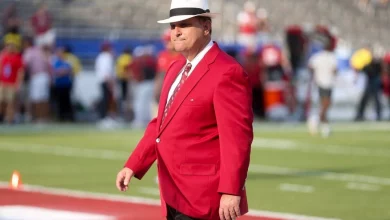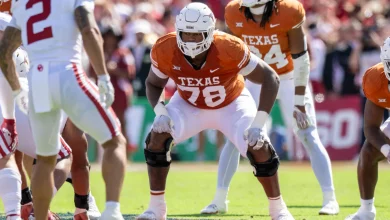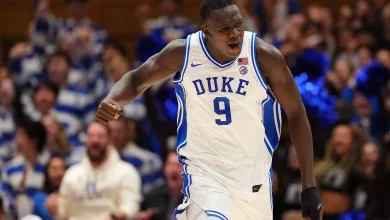Texas quarterback Quinn Ewers declares for the NFL draft, foregoing his last year of collegiate football eligibility.

In a move that has sent ripples through both the college and professional football landscapes, Texas quarterback Quinn Ewers has officially declared for the 2025 NFL Draft, electing to forgo his final year of eligibility in collegiate football. This decision, though not entirely surprising given the rise in players opting to leave college early for the NFL, marks the beginning of a new chapter in the life of one of the most highly-touted quarterbacks of his generation. For Longhorns fans and the broader football community, this moment carries significant weight as it reflects both the increasing trend of early NFL declarations and the evolving dynamics of college football’s elite prospects.
Ewers’ decision to enter the draft brings an end to his two-year tenure as Texas’ starting quarterback, during which he displayed flashes of brilliance but also faced the growing pains typical of a young signal-caller transitioning from high school to the collegiate ranks. In this analysis, we will explore the context of Ewers’ decision, evaluate his journey at Texas, and speculate on what lies ahead for the young quarterback as he prepares for the NFL.
The Rise of Quinn Ewers
Quinn Ewers’ recruitment to Texas was a spectacle in itself. The highly-anticipated 5-star recruit from Southlake, Texas, was regarded as one of the top quarterbacks of the 2022 recruiting class. He was ranked as the No. 1 overall player in the class by many scouting services, lauded for his arm strength, quick release, and natural football IQ. Ewers had initially committed to Texas in 2021, choosing to follow in the footsteps of previous standout quarterbacks who had graced the Longhorns’ roster.
Ewers’ rise to prominence was swift. After completing his high school career early, he skipped his senior year to enroll early at Ohio State, where he spent a season as a backup to C.J. Stroud, one of the top quarterbacks in college football. While Ewers didn’t see significant playing time in Columbus, his time at Ohio State was valuable in terms of development, learning under a top-tier coaching staff and refining his skills in a competitive environment. After just one season with the Buckeyes, Ewers transferred back to Texas, where he was named the starting quarterback for the 2022 season.
At Texas, Ewers’ potential began to shine through. In his first year as the Longhorns’ starter, he showcased impressive flashes of talent, particularly in big games like the 2022 victory over Alabama, where he threw for 134 yards and a touchdown before getting injured in the first quarter. His play under pressure and ability to throw downfield were highlights of his skill set, but the season was marred by inconsistency and injuries. Despite these setbacks, Ewers showed enough promise for Texas fans and scouts alike to remain hopeful about his future in Austin.
In 2023, Ewers returned to form, putting together a solid and more consistent season. He threw for over 3,000 yards, with 25 touchdowns and just 8 interceptions, leading the Longhorns to a strong finish in the Big 12. Ewers helped guide Texas to a place in the Big 12 Championship Game and an invitation to a major bowl game, providing a glimpse of the quarterback he could be with a fully healthy and improved roster. His performance in 2023 solidified his status as one of the top quarterbacks in the nation and made it clear that he had the physical tools and mental aptitude necessary for the next level.
The Decision to Enter the NFL Draft
While many analysts had speculated that Ewers might return for his junior season to further refine his game and increase his stock for the 2026 NFL Draft, his decision to declare for the 2025 draft caught many by surprise. The timing of the announcement is notable, as it comes at a time when quarterbacks entering the NFL Draft have become increasingly younger and more prepared than ever before. The likes of Patrick Mahomes, Josh Allen, and Joe Burrow have set a new precedent for young quarterbacks making the jump to the NFL, and the success of those players may have factored into Ewers’ confidence in his readiness.
Additionally, the ever-evolving landscape of college football — especially in the age of NIL (Name, Image, and Likeness) and the Transfer Portal — has created a different set of incentives for athletes. While college players used to be incentivized to stay in school for as long as possible to develop their craft, the current climate offers the potential for substantial financial gains through endorsement deals, alongside the allure of an NFL payday. Ewers has likely considered these factors, balancing the promise of a professional career with the potential for further growth as a player.
Another important aspect of this decision is the upcoming 2025 NFL Draft class. The 2025 draft is expected to feature a wealth of talented quarterbacks, including USC’s Caleb Williams and North Carolina’s Drake Maye, both of whom are widely considered top picks. Given that Ewers has the raw talent to compete with some of these quarterbacks, declaring early allows him the chance to capitalize on the current quarterback-heavy draft class, positioning himself as a first-round prospect.
Ewers’ decision also reflects the rapidly changing attitudes toward college football and its impact on players’ long-term goals. With more quarterbacks opting to declare for the draft early — including the likes of Spencer Rattler, who left South Carolina after a similarly promising season — the traditional path of staying in college for four years is no longer seen as the only route to NFL success. Ewers is choosing to bet on himself and his abilities, and there is significant upside for him to make this move at the height of his potential.
The Legacy of Quinn Ewers at Texas
While Ewers’ decision to leave Texas may feel bittersweet for fans, his legacy at Texas will be remembered fondly. Despite only spending two seasons as the Longhorns’ starting quarterback, Ewers’ time in Austin brought new energy to a program that has struggled to find consistent quarterback play since the days of Vince Young and Colt McCoy. His presence helped to reignite Texas’ relevance in the national conversation, particularly as the Longhorns made their push toward a Big 12 Championship and beyond.
Ewers also played a pivotal role in helping the Longhorns transition into the next era, as Texas prepares to join the SEC. His ability to handle the pressure of leading a program with such a rich history, and to do so in front of a passionate fan base, made him an integral part of the Texas football narrative. His clutch performances against top-tier opponents, such as Alabama, demonstrated his ability to compete with the best, and his leadership on the field set the tone for what the Longhorns could achieve in the coming seasons.
It’s worth noting that Ewers is not alone in being one of the most high-profile quarterbacks to declare early in recent years. The success stories of quarterbacks who have left college early, such as Patrick Mahomes, have paved the way for future stars like Ewers to see the NFL as a viable option sooner rather than later. Ewers’ decision is a testament to the changing landscape of college football, where top-tier talent is now willing to take risks and jump into the professional ranks sooner rather than later.
What’s Next for Quinn Ewers?
As Ewers prepares for the NFL Draft, the next step will be to focus on improving his stock in the eyes of scouts, coaches, and general managers. Ewers’ talent is undeniable; he possesses the ideal frame for an NFL quarterback (standing at 6’2” and weighing 215 pounds), and his arm strength is one of the best in the class. His mechanics are solid, and his ability to throw deep passes with accuracy and velocity is a standout feature. However, the primary question surrounding Ewers is whether he is ready to step into an NFL starting role immediately or if he will need time to develop further.
In a draft class that could feature several elite quarterbacks, Ewers’ ability to stand out will be paramount. Scouts will focus on his decision-making, his poise in the pocket, and his ability to process information at the speed required by the NFL game. While he has shown significant improvement over his two years at Texas, his trajectory will depend heavily on his performance during the pre-draft process, including the NFL Scouting Combine and individual team workouts.
Ultimately, Ewers’ journey is just beginning. If his talent and potential align with the right NFL team, he could be the next young quarterback to make an immediate impact in the league. Whether he is selected in the first round or later, there is no question that the future is bright for the Texas quarterback, and the NFL will be watching closely as he takes his next steps.









